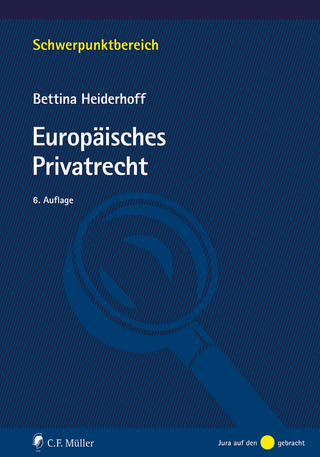
The Cambridge Handbook of Public-Private Partnerships, Intellectual Property Governance, and Sustainable Development
Cambridge University Press (Verlag)
978-1-107-17583-9 (ISBN)
Public–private partnerships (PPPs) play an increasingly prominent role in addressing global development challenges. United Nations agencies and other organizations are relying on PPPs to improve global health, facilitate access to scientific information, and encourage the diffusion of climate change technologies. For this reason, the 2030 Agenda for Sustainable Development highlights their centrality in the implementation of the Sustainable Development Goals (SDGs). At the same time, the intellectual property dimensions and implications of these efforts remain under-examined. Through selective case studies, this illuminating work contributes to a better understanding of the relationships between PPPs and intellectual property considered within a global knowledge governance framework, that includes innovation, capacity-building, technological learning, and diffusion. Linking global governance of knowledge via intellectual property to the SDGs, this is the first book to chart the activities of PPPs at this important nexus.
Margaret Chon is the Donald and Lynda Horowitz Professor for the Pursuit of Justice, and former Associate Dean for Research at Seattle University School of Law, where her current research explores the relationship of intellectual property to human and sustainable development. Pedro Roffe is a Senior Fellow at the International Centre for Trade and Sustainable Development, where his work focuses on intellectual property, foreign investment, transfer of technology and international economic negotiations. Ahmed Abdel-Latif is the Chief, Office of the Director General, at the International Renewable Energy Agency. Previously, he was Senior Programme Manager for Innovation, Technology and Intellectual Property at the International Centre for Trade and Sustainable Development.
Introduction; 1. Charting the triple interface of public-private partnerships, global knowledge governance, and sustainable development goals Margaret Chon, Pedro Roffe and Ahmed Abdel-Latif; Part I. Public Health: 2. Public-private partnerships as models for new drug research and development: the future as now Frederick Abbott; 3. Driving innovation for global health through multi-stakeholder partnerships Anatole Krattiger, Thomas Bombelles and Ania Jedrusik; 4. Creating, managing, and advancing collaborations: the road to successful partnerships Katy M. Graef, Jennifer Dent and Amy Starr; 5. Patent pooling in public health Esteban Burrone; 6. Intellectual property in early-phase research public-private partnerships in the biomedical sector Hilde Stevens and Isabelle Huys; Part II. Education, ICT and Libraries: 7. A publisher perspective on a public-private partnership for access to biomedical information Jens Bammel; 8. A sustainable development agenda for the World Intellectual Property Organization: networked governance and public-private partnerships Sara Bannerman; 9. The Marrakesh Treaty, public-private partnerships, and access to copyrighted works by visually impaired persons Susan Isiko Štrba; 10. Intellectual property and public-private partner motivations: lessons from a digital library Melissa Levine; Part III. Green Technologies and Agriculture: 11. The rise of public-private partnerships in green technologies and intellectual property rights Ahmed Abdel-Latif; 12. Innovation law and policy choices for climate change-related public-private partnerships Joshua Sarnoff and Margaret Chon; 13. How do climate change and energy-related partnerships impact innovation and technology transfer? Ayşem Mert and Philipp Pattberg; 14. One size does not fit all: the role of the state and the private sector in the governing framework of geographical indications Irene Calboli and Delphine Marie-Vivienne; Part IV. Governance and Institutional Design Perspectives: 15. Public-private partnerships and technology sharing: existing models and future institutional designs Padmashree Gehl Sampath; 16. From the MDGs to the SDGs: cross-sector partnerships as avenues to development in the UN system David J. Maurrasse; 17. Sustainable development through a cross-regional research partnership Chidi Oguamanam and Jeremy De Beer; 18. Intellectual property, human rights and public-private partnerships Peter K. Yu; Conclusions; 19. The triple interface: findings and future directions Margaret Chon.
| Erscheinungsdatum | 10.10.2018 |
|---|---|
| Reihe/Serie | Cambridge Law Handbooks |
| Zusatzinfo | Worked examples or Exercises; 3 Tables, black and white; 13 Halftones, black and white; 1 Line drawings, black and white |
| Verlagsort | Cambridge |
| Sprache | englisch |
| Maße | 183 x 261 mm |
| Gewicht | 1190 g |
| Themenwelt | Recht / Steuern ► EU / Internationales Recht |
| Recht / Steuern ► Privatrecht / Bürgerliches Recht ► Internationales Privatrecht | |
| Recht / Steuern ► Wirtschaftsrecht ► Urheberrecht | |
| ISBN-10 | 1-107-17583-6 / 1107175836 |
| ISBN-13 | 978-1-107-17583-9 / 9781107175839 |
| Zustand | Neuware |
| Haben Sie eine Frage zum Produkt? |
aus dem Bereich


